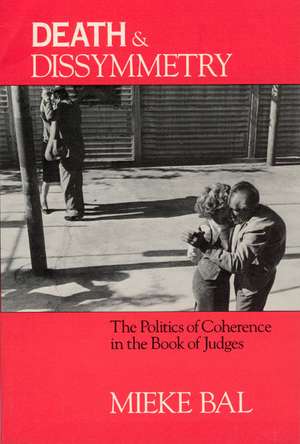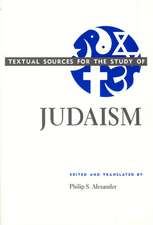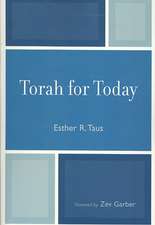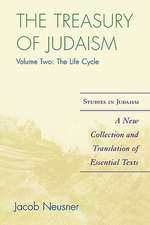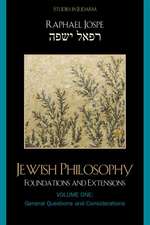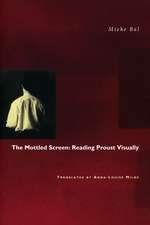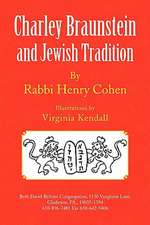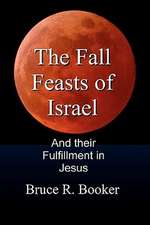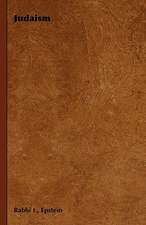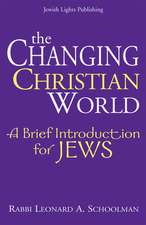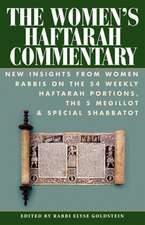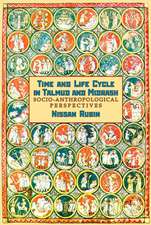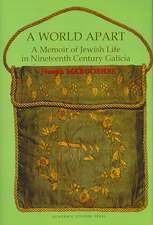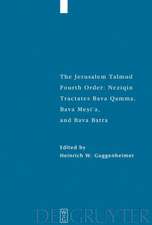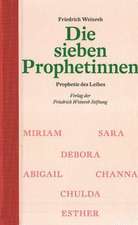Death and Dissymmetry: The Politics of Coherence in the Book of Judges: Chicago Studies in the History of Judaism
Autor Mieke Balen Limba Engleză Paperback – 31 mai 1988
Combining literary criticism and feminist analysis, Death and Dissymmetry radically reinterprets not only the Book of Judges but also the tradition of its reception and understanding in the West. In Mieke Bal's account, Judges documents the Israelite culture learning to articulate itself in a decisive period of transition.
Counter to standard readings of Judges, Bal's interpretation demonstrates that the book has a political and ideological coherence in which the treatment of women plays a pivotal role. Bal concentrates here not on the assassinations and battles that rage through Judges but on the violence in the domestic lives of individual characters, particularly sexual violence directed at women. Her skillful reading reveals that murder, in this text, relates to gender and reflects a social structure that is inherently contradictory. By foregrounding the stories of women and subjecting them to subtle narrative analysis, she is able to expose a set of preoccupations that are essential to the sense of these stories but are not articulated in them. Bal thereby develops a "countercoherence" in conflict with the apparent emphases of Judges—the politics, wars, and historiography that have been the constant focus of commentators on the book.
Death and Dissymmetry makes an important contribution to the development of a feminist method of interpreting ancient texts, with consequences for religious studies, ancient history, literary theory, and gender studies.
Counter to standard readings of Judges, Bal's interpretation demonstrates that the book has a political and ideological coherence in which the treatment of women plays a pivotal role. Bal concentrates here not on the assassinations and battles that rage through Judges but on the violence in the domestic lives of individual characters, particularly sexual violence directed at women. Her skillful reading reveals that murder, in this text, relates to gender and reflects a social structure that is inherently contradictory. By foregrounding the stories of women and subjecting them to subtle narrative analysis, she is able to expose a set of preoccupations that are essential to the sense of these stories but are not articulated in them. Bal thereby develops a "countercoherence" in conflict with the apparent emphases of Judges—the politics, wars, and historiography that have been the constant focus of commentators on the book.
Death and Dissymmetry makes an important contribution to the development of a feminist method of interpreting ancient texts, with consequences for religious studies, ancient history, literary theory, and gender studies.
Din seria Chicago Studies in the History of Judaism
-
 Preț: 215.51 lei
Preț: 215.51 lei -
 Preț: 321.18 lei
Preț: 321.18 lei -
 Preț: 293.81 lei
Preț: 293.81 lei -
 Preț: 263.53 lei
Preț: 263.53 lei -
 Preț: 261.66 lei
Preț: 261.66 lei -
 Preț: 312.70 lei
Preț: 312.70 lei -
 Preț: 294.96 lei
Preț: 294.96 lei -
 Preț: 288.42 lei
Preț: 288.42 lei -
 Preț: 284.56 lei
Preț: 284.56 lei -
 Preț: 293.04 lei
Preț: 293.04 lei -
 Preț: 231.56 lei
Preț: 231.56 lei -
 Preț: 315.58 lei
Preț: 315.58 lei -
 Preț: 263.57 lei
Preț: 263.57 lei -
 Preț: 320.80 lei
Preț: 320.80 lei -
 Preț: 248.05 lei
Preț: 248.05 lei - 20%
 Preț: 160.30 lei
Preț: 160.30 lei - 22%
 Preț: 522.75 lei
Preț: 522.75 lei - 12%
 Preț: 310.42 lei
Preț: 310.42 lei - 16%
 Preț: 261.16 lei
Preț: 261.16 lei
Preț: 291.90 lei
Nou
Puncte Express: 438
Preț estimativ în valută:
55.85€ • 58.47$ • 46.22£
55.85€ • 58.47$ • 46.22£
Carte tipărită la comandă
Livrare economică 07-21 aprilie
Preluare comenzi: 021 569.72.76
Specificații
ISBN-13: 9780226035550
ISBN-10: 0226035557
Pagini: 319
Dimensiuni: 152 x 229 x 23 mm
Greutate: 0.45 kg
Ediția:1
Editura: University of Chicago Press
Colecția University of Chicago Press
Seria Chicago Studies in the History of Judaism
ISBN-10: 0226035557
Pagini: 319
Dimensiuni: 152 x 229 x 23 mm
Greutate: 0.45 kg
Ediția:1
Editura: University of Chicago Press
Colecția University of Chicago Press
Seria Chicago Studies in the History of Judaism
Notă biografică
Mieke Bal is professor of comparative literature and Susan B. Anthony Professor of Women's Studies at the University of Rochester. Her books include Lethal Love: Literary Feminist Interpretations of Biblical Love Stories and Murder and Difference: Gender, Genre and Scholarship on Sisera's Death.
Cuprins
Acknowledgments
Introduction
1. The Coherence of Politics and the Politics of Coherence
Two Views of the Book of Judges
How History Constructs Itself
The Construction of a Different History
The Coherence of Dissymmetry
Heroes of Might and Women of Death
Lethal Ladies
Gender, Sex, and Dissymmetry
Other Female Characters
The Language of Power
2. Virginity and Entanglement
Bath-Jephthah: The Daughter's Gift
Negation and Denial of Womanhood
Freud Entangled
Love at First Sight
Bath's Survival
3. Virginity Scattered
Paradoxes of Virginity
Nonvirginal Virgins, Virginal Spouses
Between Virgin and Wife: Caught Between Men
4. Violence and the Sacred: Contribution to the Ethnography of Fatherhood
The Raw and the Cooked
In the Name of the Law: Proper Sacrifice
Manoah's Failed Fatherhood
In the Name of the Vow: Improper Sacrifice
Bath-Jephthah versus Ben-Abraham: A Case for Separation
Dreaming Fire: Violence without the Sacred
The Body Became Voice, or the Reinforcement of Culture
5. The Scandal of the Speaking Body: From Speech-act to Body Language
Speech-acts: The Word Become Flesh
Samson's Riddle: The Word Became Woman
The Riddle as Vow and the Vow as Riddle
The Daughter's Body Language as a Challenge to Fatherhood
The Mouth of the S/Word
6. The Architecture of Unhomeliness
Oppositions
Limits
Dialectic
Unhomeliness Revisited
The Empty House Is Haunted
7. The Displacement of the Mother
Explicit Mothers: Jephthah's and Abimelech's, Samson's and Micah's
Explicit Mothers: Sisera's and Israel's
Displaced Mothers: Yael
Displaced Mothers: The Woman-with-the-Millstone
Displaced Mothers: Delilah
Mothering, Murdering, Making Love: Yael
Clytemnestra's Absence
Conclusion
The I, the Eye, and Objectification
The Incoherence of Coherence
Once Upon a Time
Once More: Body Language
Appendix 1: A Model for Narratological Analysis
Appendix 2: Notes on Language
Notes
Bibliography
Index
Introduction
1. The Coherence of Politics and the Politics of Coherence
Two Views of the Book of Judges
How History Constructs Itself
The Construction of a Different History
The Coherence of Dissymmetry
Heroes of Might and Women of Death
Lethal Ladies
Gender, Sex, and Dissymmetry
Other Female Characters
The Language of Power
2. Virginity and Entanglement
Bath-Jephthah: The Daughter's Gift
Negation and Denial of Womanhood
Freud Entangled
Love at First Sight
Bath's Survival
3. Virginity Scattered
Paradoxes of Virginity
Nonvirginal Virgins, Virginal Spouses
Between Virgin and Wife: Caught Between Men
4. Violence and the Sacred: Contribution to the Ethnography of Fatherhood
The Raw and the Cooked
In the Name of the Law: Proper Sacrifice
Manoah's Failed Fatherhood
In the Name of the Vow: Improper Sacrifice
Bath-Jephthah versus Ben-Abraham: A Case for Separation
Dreaming Fire: Violence without the Sacred
The Body Became Voice, or the Reinforcement of Culture
5. The Scandal of the Speaking Body: From Speech-act to Body Language
Speech-acts: The Word Become Flesh
Samson's Riddle: The Word Became Woman
The Riddle as Vow and the Vow as Riddle
The Daughter's Body Language as a Challenge to Fatherhood
The Mouth of the S/Word
6. The Architecture of Unhomeliness
Oppositions
Limits
Dialectic
Unhomeliness Revisited
The Empty House Is Haunted
7. The Displacement of the Mother
Explicit Mothers: Jephthah's and Abimelech's, Samson's and Micah's
Explicit Mothers: Sisera's and Israel's
Displaced Mothers: Yael
Displaced Mothers: The Woman-with-the-Millstone
Displaced Mothers: Delilah
Mothering, Murdering, Making Love: Yael
Clytemnestra's Absence
Conclusion
The I, the Eye, and Objectification
The Incoherence of Coherence
Once Upon a Time
Once More: Body Language
Appendix 1: A Model for Narratological Analysis
Appendix 2: Notes on Language
Notes
Bibliography
Index
